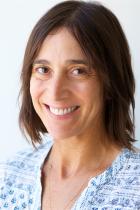Karyn Kaplan

Thailand, 2009
Independent Health and Human Rights Consultant, Independent
Before participating in the Human Rights Advocates Program in 2009, Kaplan had worked for nearly ten years in Bangkok as the co-founder and Policy and Development Director at the Thai AIDS Treatment Action Group (TTAG). When asked about her experience at HRAP, Kaplan writes, “I gained practical knowledge and skills that built upon my human rights work in Thailand and globally, and I made contacts with extraordinary advocates who continue to inspire and motivate me to continue my work.”
The Human Rights Advocates Program is a four-month program at Columbia University that provides participants with the resources to learn and grow as human rights advocates. Advocates are required to audit at least two graduate-level courses at Columbia University. Kaplan writes, “The opportunity to engage and study with prestigious human rights and law professors expanded my knowledgebase and shaped my perspective on human rights.” In addition to graduate coursework in law and human rights, HRAP supplemented her human rights work in Thailand through advocacy trainings, valuable workshops and networking opportunities. In reflecting on her the way that HRAP influenced her work, she concludes, “The extraordinary peers and expert instructors and various human rights leaders we met through the program continue to be one of my greatest inspirations, source of solidarity and support, and a sense of community in a time when human rights are under attack around the world. “
Since her participation in HRAP, Kaplan continued to work with Thai AIDS Treatment Action Group (TTAG) in Thailand, helping to bring HIV-related services to highly marginalized and criminalized at-risk populations, including people who use drugs and people in prison. She also helped establish a global coalition to expand access to the hepatitis C cure while working for Treatment Action Group (TAG) in New York. I then became Executive Director of Asia Catalyst, where for six years I worked on building human rights documentation and advocacy capacity for grassroots groups in China and Southeast Asia, mainly Myanmar. Kaplan was selected to be in the Human Rights group of the Global Fund's Technical Review Panel (TRP), reviewing country applications - and eventually was elected to Human Rights Focal Point in her last serving year. After that, she has been doing work for the Global Fund to Fight AIDS, Tuberculosis and Malaria, for example evaluating country programs to remove human rights barriers for people at high risk for HIV/AIDS, including LGBTQ people, sex workers, people who use drugs, and others.
She has co-authored numerous publications in collaboration with the University of British Columbia Urban Health Research Institute on barriers to healthcare access and problems of police abuse for people who inject drugs in Thailand. She has given numerous presentations, including a plenary at the International Conference on AIDS in Asia and the Pacific (ICAAP) in 2011. She was recently selected to serve on the Human Rights Reference Group for the Global Fund to Fight AIDS, TB and Malaria (GFATM).
Kaplan is a recipient of the 2009 John M. Lloyd Foundation HIV/AIDS Leadership Award, and the Health GAP Founders Award.






